Missing Teeth Make America Great Again
Facts affair: Sign upwardly for the complimentary Mother Jones Daily newsletter. Support our nonprofit reporting. Subscribe to our print magazine.
In a framed photo of herself taken in 2007, Sharon Galicia stands, fresh-faced and beaming, beside beginning lady Laura Bush at a Washington, DC, luncheon, thrilled to be honored as an outstanding GOP volunteer. We are in her function in the Aflac insurance company in Lake Charles, Louisiana, and Sharon is heading out to pitch medical and life insurance to workers in a bleak corridor of industrial plants servicing the rigs in the Gulf of Mexico and petrochemical plants that make the plastic feedstock for everything from car seats to chimera gum.
After a 20-infinitesimal drive along flat terrain, we pull into a clay parking lot beside a red truck with a decal of the Statue of Liberty, her raised arm property an M-16. A man waves from the entrance to an enormous warehouse. Warm, bonny, well-spoken, Sharon has sold a lot of insurance policies around here and fabricated friends along the fashion.
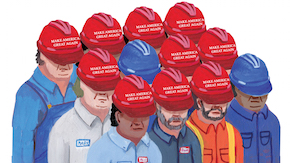
A policy with a weekly premium of $5.52 covers accidents that aren't covered by a worker's other insurance—if he has whatsoever. "How many of y'all can get a week without your paycheck?" is part of Sharon's pitch. "Usually no hands go upward," she tells me. Her clients repair oil platforms, cutting sheet metal, gear up refrigerators, process craven, lay asphalt, and dig ditches. She sells to entry-level floor sweepers who brand $8 an hour and tin can't afford to become sick. She sells to flaggers in highway repair crews who earn $12 an hour, and to welders and operators who, with overtime, brand up to $100,000 a twelvemonth. For most, education stopped afterward loftier school. "Pipe fitters. Ditch diggers. Cobblestone layers," Sharon says. "I tin't find one that's not for Donald Trump."
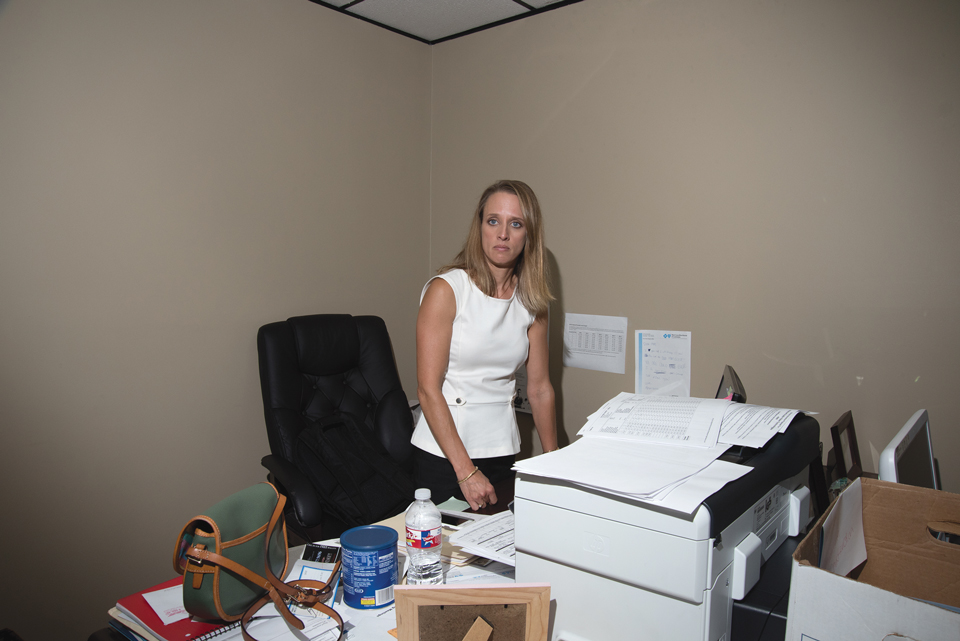
Sharon Galicia sells accident insurance to Louisiana laborers. Stacy Kranitz
I commencement met Sharon at a gathering of tea party enthusiasts in Lake Charles in 2011. I told them I was a sociologist writing a volume near America's ever-widening political divide. In their 2008 book, The Big Sort, Bill Bishop and Robert Cushing showed that while Americans used to motion mainly for individual reasons like college-paid jobs, nicer weather, and better homes, today they as well prioritize living about people who retrieve like they do. Left and Right have become subnations, as George Saunders recently wrote in The New Yorker, living like housemates "no longer on speaking terms" in a house gear up afire by Trump, gaping at one another "through the smoke."
I wanted to leave my subnation of Berkeley, California, and enter another as far right as Berkeley is to the left. White Louisiana looked like it. In the 2012 election, 39 percent of white voters nationwide bandage a ballot for President Barack Obama. That effigy was 28 percent in the Due south, but about xi percentage in Louisiana.
To effort to understand the tea party supporters I came to know—I interviewed 60 people in all—over the adjacent 5 years I did a lot of "visiting," as they call it. I asked people to show me where they'd grown up, been baptized, and attended school, and the cemetery where their parents had been buried. I perused loftier school yearbooks and photograph albums, played cards, and went fishing. I attended meetings of Republican Women of Southwest Louisiana and followed the campaign trails of two correct-wing candidates running for Congress.
When I asked people what politics meant to them, they often answered by telling me what they believed ("I believe in freedom") or who they'd vote for ("I was for Ted Cruz, but now I'chiliad voting Trump"). But running beneath such beliefs like an underwater spring was what I've come to think of every bit a deep story. The deep story was a feels-equally-if-information technology's-true story, stripped of facts and judgments, that reflected the feelings underpinning opinions and votes. It was a story of unfairness and feet, stagnation and slippage—a story in which shame was the companion to demand. Except Trump had opened a divide in how tea partiers felt this story should cease.
It was a story of unfairness and feet, stagnation and slippage—a story in which shame was the companion to need.
"Hey Miss Sharon, how ya' doin'?" A fiftysomething man I'll telephone call Albert led us through the warehouse, where sheet metal had been laid out on large tables. "Want to come over Saturday, assist u.s.a. make sausage?" he chosen over the eeeeech of an unseen electric saw. "I'm seasoning information technology different this year." The year earlier, Sharon had taken her 11-year-erstwhile daughter along to assistance stuff the spicy smoked-pork-and-rice sausage, to which Albert added footing deer meat. "I'll bring Alyson," Sharon said, referring to her girl. Some days they'd have 400 pounds of deer meat and offer her some. "They're really good to me. And I'm at that place for them as well when they need something."
These men had little shelter from bad news. "If you dice, who'south going to bury you?" Sharon would ask on such calls. "Do you have $10,000 sitting effectually? Will your parents have to borrow money to bury yous or your wife or girlfriend? For $1.44 a week, yous get $xx,000 of life insurance."
Louisiana is the state'south third-poorest state; ane in 5 residents live in poverty. Information technology ranks third in the proportion of residents who go hungry each year, and dead last in overall health. A quarter of the state's students driblet out from high schoolhouse or don't graduate on time. Partly as a result, Louisiana leads the nation in its proportion of "disconnected youth"—20 percent of xvi- to 24-year-olds in 2013 were neither in school nor at piece of work. (Nationally, the effigy is 14 percent.) Only 6 percent of Louisiana workers are members of labor unions, about half the rate nationwide.
Louisiana is besides home to vast pollution, especially along Cancer Alley, the 85-mile strip forth the lower Mississippi between Baton Rouge and New Orleans, with some 150 industrial plants where once at that place were sugar and cotton plantations. According to the American Cancer Society, Louisiana had the nation'south second-highest incidence of cancer for men and the 5th-highest charge per unit of male person deaths from cancer. "When I make a presentation, if I say, 'How many of you lot know someone that has had cancer?' every hand is going to go upward. Just the other day I was in Lafayette doing my enrollments for the insurance, and I was talking to this i guy. And he said, 'My brother-in-law but died. He was 29 or xxx.' He's the third person working for his company that'due south been in their early 30s that's died of cancer in the last iii years. I file tons and tons of cancer claims."
Sharon as well faced economic doubt. A divorced mother of two, she supported herself and two children on an aplenty but erratic income, all from commission on her Aflac sales. "If you lot're starting out, yous might become 99 'noes' for every one 'yes.' Afterwards sixteen years on the task, I get fifty pct 'yeses.'" This put her at the acme among Aflac salespeople; still, she added, "If it's a slow month, nosotros eat peanut butter."

The thou of a Trump supporter Stacy Kranitz
Until a few years agone, Sharon had also collected hire from 80 tenants in a trailer court. Her ex-husband earned $40,000 as a sales manager at Pacific Sunwear, she explained, and helped with child back up; altogether information technology immune her to pay her children's tuition at a parochial school and stay current on the mortgage of a tastefully furnished, spacious ranch business firm in suburban Moss Bluff. She lived in the broken-hearted middle.
And from this vantage betoken, the lives of renters in her trailer park, chosen Crestwood Community, had both appalled and unnerved her. Some of her tenants, lxxx pct of whom were white, had affair-of-factly admitted to lying to get Medicaid and food stamps. When she'd asked a boy her son'south age about his plans for the future, he answered, "I'grand just going to get a [inability] check, similar my mama." Many renters had been, she told me, able-bodied, idle, and on disability. One beau had claimed to accept seizures. "If you have seizures, that'due south almost a surefire way to get disability without proving an disquiet," she said. A lot of Crestwood Community residents supposedly had seizures, she added. "Seizures? Really?"
As nosotros collection through the vacated lot, we passed abandoned trailers with doors flung open up, tall grass pockmarked with holes where mailboxes one time stood. Unable to pay an astronomical h2o bill, Sharon had been forced to close the trailer park, giving residents a calendar month's discover and provoking their resentment.
In truth, Sharon felt relief. Her renters, she said, had been a hard-living lot. A jealous boyfriend had murdered his girlfriend. Some men drank and beat out their wives. One man had married his son'southward ex-married woman. Beyond that, Sharon had felt unfairly envied by them. "I've been called a rich bitch. They recall Miss Sharon lives the life of Riley." And while her domicile was a 25-minute drive away, the life of her renters had felt entirely besides close for condolement. "You couldn't talk to anyone at Crestwood whose teeth weren't falling out, gums black, missing teeth," adding that she gave out toothbrushes and toothpaste one Christmas. "My kids brand fun of me considering I brush my teeth so much."
To her, the trailer park both did and did not feel worlds away. For ane thing, a person's standard of living, their worldview and basic identity, seemed already assault a flooring of Jell-O. Who could know for sure how you would fare in the era of an expanding lesser, spiking top, and receding middle class?
Sharon'south maternal grandad had established a successful line of local furniture stores and shown how far up a human with gumption could ascension. Sharon herself had graduated magna cum laude from McNeese Land University in Lake Charles and been elected president of Republican Women of Southwest Louisiana. Only her youngest brother had dropped out of loftier school and, while very vivid and athletic, had not found his way. Her father, a constitute worker who'd left her mom when Sharon was a teen, had remarried and moved to a trailer in Sulphur with his new wife, a mother of four. Looking around her, Sharon saw family and friends who struggled with bad relationships and joblessness. Some collected food stamps. "I don't get information technology," she said, "and it drives me basics."
For Sharon, being on the dole raised basic issues of duty, honor, and shame. It had been hard to collect hire that she knew derived from disability checks, paid, in the cease, past hardworking taxpayers like her. "I pay $9,000 in taxes every year and nosotros get zip for it," she said. Like others I interviewed, she felt that the federal government—especially under President Obama—was bringing downwards the hardworking rich and struggling center while lifting the idle poor. She'd seen it immediate and information technology felt unfair.
"He'due south had like eight surgeries. He's notwithstanding working, though. He doesn't want anything from the government. He's such a neat guy."
Every bit we drove from the trailer park to her home, Sharon reflected on human being ambition: "You can just see it in some guys' eyes; they're aiming college. They don't want a handout." This was the central betoken of one of Sharon's favorite books, Barefoot to Billionaire, past oil magnate Jon Huntsman Sr. (whose son ran in the 2012 Republican presidential primary). Ambition was good. Earning money was proficient. The more money you lot earned, the more yous could requite to others. Giving was adept. And so ambition was the fundamental to goodness, which was the ground for pride.
If you could work, even for pennies, receiving government benefits was a source of shame. It was okay if yous were one of the few who actually needed it, but non otherwise. Indignation at the overuse of welfare spread, in the minds of tea party supporters I got to know, to the federal government itself, and to country and local agencies. A retired banana fire chief in Lake Charles told me, "I got told we don't need an assistant fire chief. A lot of people around here don't like any public employees, apart from the constabulary." His married woman said, "Nosotros were making such low pay that we could take been on nutrient stamps every month and other welfare stuff. And [an official] told our departments that if we went and got food stamps or welfare it would expect bad for Lake Charles so that he would fire u.s.." A public schoolhouse teacher complained, "I've had people tell me, 'It'due south the teachers who need to pass the kids' tests.' They accept no idea what I know." A social worker who worked with drug addicts said, "I've been told the church should take care of addicts, non the regime." Both receivers and givers of public services were tainted—in the eyes of nearly all I came to know—by the very touch of authorities.
Sharon peculiarly admired Albert, a middle-aged sheet metal worker who could have used assistance just was too proud to ask for information technology. "He's had open up-heart surgery. He'southward had tum surgery. He'south had like eight surgeries. He's nonetheless working, though. He wants to work. He's got a daughter in jail—her third DUI, so he'southward raising her son—and this and that. But he doesn't want annihilation from the government. He's such a neat guy." There was no mention of the need for a skillful alcoholism rehab plan for his daughter or subsequently-school programs for his grandson. Until a few days before his decease Albert continued working, head high, shame-free.
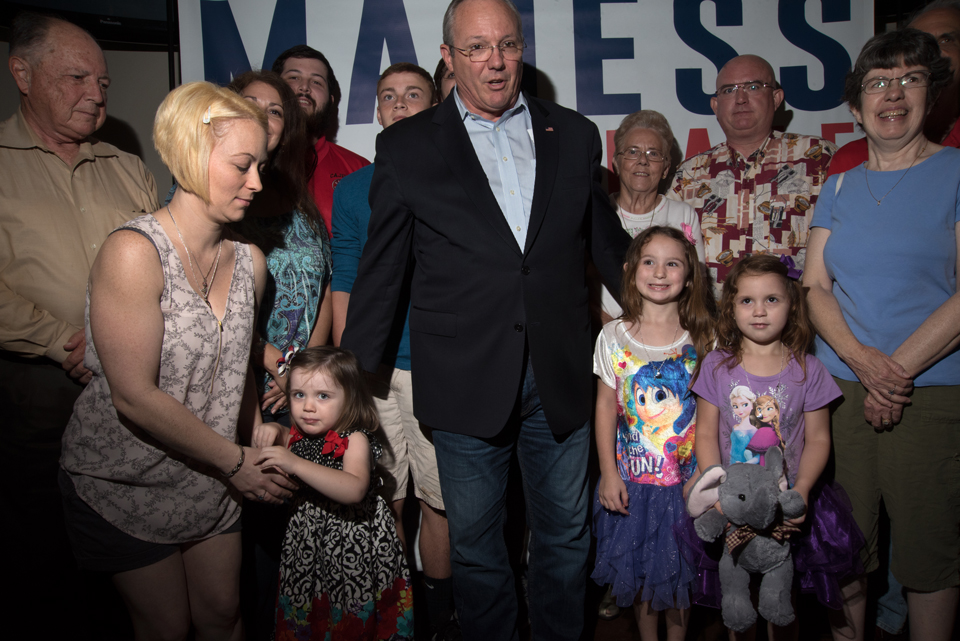
Rob Maness, a Republican candidate for U.s.a. Senate in Louisiana, speaks at a tea party meet-and-greet. Stacy Kranitz
Sharon'due south politics were partly rooted, it seemed, in the form slippage of her childhood. Equally the oldest of three, the "fiddling mama" to two younger brothers, she said, "I got them up in the morn, fabricated their beds for them, and then my mama wouldn't come downwardly difficult on them." Sharon'south mother, the girl of that prosperous furniture store owner, had grown up with a blackness maid who'd made her bed for her. She'd married a highly intelligent only high-school-educated plant worker, a Vietnam vet who never spoke of the war and seemed in search of peace and tranquility. Privileges came and went in deeply unsettling ways and made a person desire to concur on to a reassuring past. "In one case when I had to travel to Florida on work, I left the kids with my mom, and Bailey called me for assist: 'Grandma'southward forcing me to make her bed!'" Sharon answered, "I'thou actually sorry, Bailey; make her bed."
With the proud retention of an affluent Southern white girlhood, her mother took a dim view of the federal regime. She'd trained as a social worker, volunteered in a women's prison, and remembered its inmates in her daily prayer. A devoted Christian, Sharon's mother believed in a generous church. Simply government benefits were a very unlike story. Taking them meant yous'd fallen and weren't proudly trying to rise back up.
As we pulled up to her home, Sharon reflected on diverse theories her mother had. "Take you heard of the Illuminati? The New World Society?" Sharon asked so as to gear up me. "I'm tea party," Sharon said, "but I don't proceed with a lot that my mom does." Whether they clung to such dark notions or laughed them off, tea party enthusiasts lived in a roaring rumor-sphere that offered answers to deep, abiding anxieties. Why did President Obama take off his wristwatch during Ramadan? Why did Walmart run out of ammunition on the third Tuesday in March? Did you lot know drones can detect how much coin you take? Many described these every bit suspicions other people held. Many seemed to float in a zone of one-half-belief.
The about widespread of these suspicions, of grade—shared past 66 per centum of Trump supporters—is that Obama is Muslim.
What the people I interviewed were fatigued to was not necessarily the particulars of these theories. It was the deep story underlying them—an account of life as it feels to them. Some such account underlies all beliefs, right or left, I recollect. The deep story of the right goes like this:
Y'all are patiently standing in the center of a long line stretching toward the horizon, where the American Dream awaits. Simply every bit yous expect, you see people cutting in line alee of yous. Many of these line-cutters are black—beneficiaries of affirmative activeness or welfare. Some are career-driven women pushing into jobs they never had before. Then you lot run across immigrants, Mexicans, Somalis, the Syrian refugees yet to come. As you expect in this unmoving line, you lot're being asked to feel sorry for them all. You have a proficient eye. But who is deciding who you should feel compassion for? Then you come across President Barack Hussein Obama waving the line-cutters frontward. He'southward on their side. In fact, isn't he a line-cutter also? How did this fatherless black guy pay for Harvard? Every bit y'all wait your turn, Obama is using the money in your pocket to help the line-cutters. He and his liberal backers accept removed the shame from taking. The authorities has become an musical instrument for redistributing your coin to the undeserving. Information technology'southward non your authorities anymore; it'southward theirs.
I checked this distillation with those I interviewed to see if this version of the deep story rang true. Some altered it a scrap ("the line-waiters class a new line") or emphasized a detail point (those in back are paying for the line-cutters). Merely all of them agreed information technology was their story. One human being said, "I live your analogy." Another said, "You read my mind."
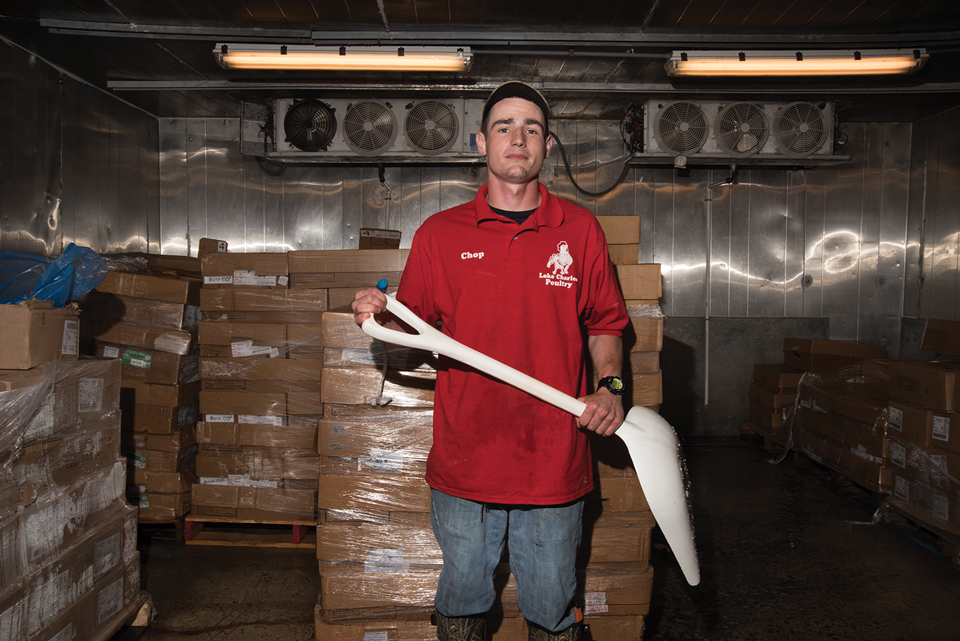
A poultry worker in Lake Charles Stacy Kranitz
The deep story reflects hurting; y'all've washed everything right and you're notwithstanding slipping dorsum. It focuses blame on an ill-intentioned government. And it points to rescue: The tea political party for some, and Donald Trump for others. Just what had happened to brand this deep story band true?
Almost of the people I interviewed were eye class—and nationally more than half of all tea political party supporters earn at least $fifty,000, while almost a tertiary earn more than $75,000 a year. Many, however, had been poor every bit children and felt their rising to have been an uncertain i. As one wife of a well-to-do contractor told me, gesturing around the buck heads hanging higher up the large stone fireplace in the spacious living room of her Lake Charles habitation, "We have our American Dream, just we could lose it all tomorrow."
Existence middle class didn't mean you felt secure, considering that class was thinning out equally a tiny elite shot up to great wealth and more people fell into a life of broken teeth, unpaid rent, and shame.
Growing upwards, Sharon had felt the struggle it took for her family to "stand up in line" in a tumultuous world. Three years afterward her father wordlessly left dwelling when she was 17, Sharon married, shortly embracing a covenant marriage—i that requires premarital counseling and sets stricter grounds for divorce. Just so they did divorce, and Sharon, in one case the little mother to her own siblings, now institute herself a single mother of two—a mom and dad both. She was doing her level best merely wondered why the travails of others so oft took precedence over families such as her own. Affirmative-Action blacks, immigrants, refugees seemed to so routinely receive sympathy and authorities help. She, as well, had sympathy for many, but, as she saw it, a liberal sympathy machine had been attack automatic, disregarding the giving chapters of families like hers.
Or as i tea partier wrote to me: "We're so broke. Where does this food & welfare money come from? How tin can free stuff (including college, which my 4.2 student needs) even be on the tabular array when the United states owes $xix,343,541,768,824.00 equally of July 1? Is it just me or does it seem similar the just matter ANYONE cares about is themselves and their immediate circumstances?"
Pervasive among the people I talked to was a sense of detachment from a distant elite with whom they had ever less contact and less in mutual. And, as older white Christians, they were acutely aware of their demographic reject. "You lot can't say 'merry Christmas,' yous have to say 'happy holidays,'" one person said. "People aren't clean living anymore. You're considered ignorant if y'all're for that." An auditor told me, "Other people say, 'Yous're too hard-nosed most [morals].' Better to be hard-nosed than to be like it is now, so permissive about everything." They also felt disrespected for holding their values: "You're a weak woman if you don't believe that women should, you know, simply elbow your way through society. You're non in the 'in' crowd if you lot're not a liberal. You lot're an old-fashioned old fogey, small thinking, small town, gun loving, religious," said a minister'southward wife. "The media tries to brand the tea political party look like bigots, homophobic; it's not." They resented all labels "the liberals" had for them, particularly "backward" or "ignorant Southerners" or, worse, "rednecks."
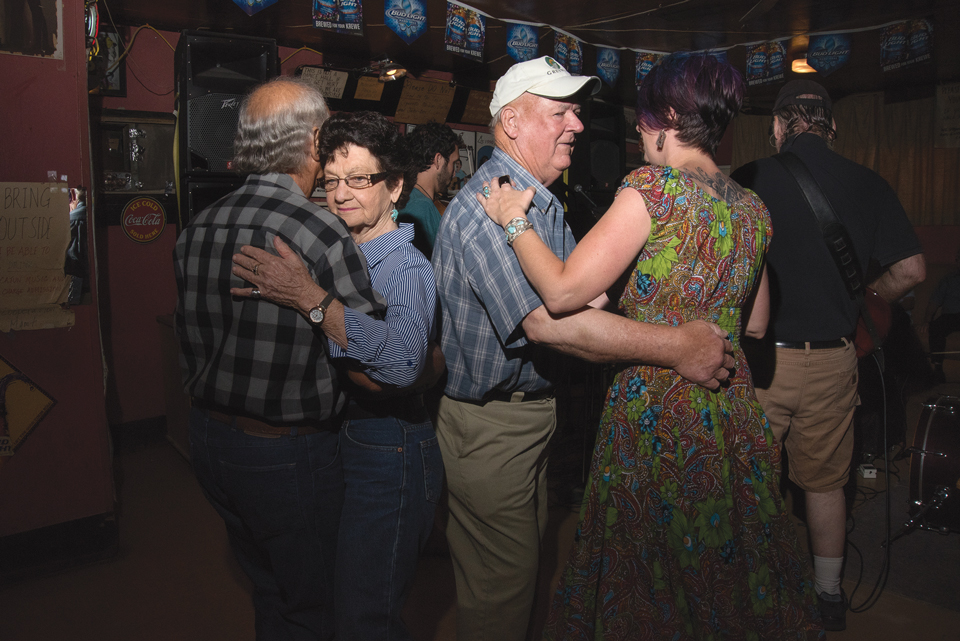
Dancing to a Cajun band at Fred'due south Lounge in Mamou, Louisiana Stacy Kranitz
Liberal tv pundits and bloggers took easy potshots at them, they felt, which hardened their defenses. Their Facebook pages and then filled with news coverage of liberals beating upward fans at Trump rallies and Play tricks News coverage of white policemen shot by black men.
For some, age had besides become a source of humiliation. One white evangelical tea party supporter in his early 60s had lost a good job equally a sales manager with a telecommunication company when it merged with another. He took the shock bravely. Only when he tried to get rehired, it was terrible. "I called, emailed, called, emailed. I didn't hear a thing. That was totally an age discrimination thing." At last he constitute a job at $10 an hour, the same wage he had earned at a summer factory union job as a college student 40 years agone. Age brought no nobility. Nor had the privilege linked to beingness white and male trickled down to him. Like Sharon'southward clients in the petrochemical plants, he felt like a stranger in his ain land.
But amid those walking in this wilderness, Trump had opened up a divide. Those more in the middle class, such as Sharon, wanted to halt the "line-cutters" by slashing authorities giveaways. Those in the working class, such as her Aflac clients, were drawn to the idea of hanging on to government services but limiting access to them.
Sharon was a giving person, but she wanted to roll back government help. It was hard supporting her kids and being a good mom likewise. Managing the trailer park had chosen on her grit, determination, even hardness—which she regretted. She mused, "Having to cope, run the trailer court, even threaten to shoot a dog"—her tenant's pet had endangered children—"it's hardened me, made me act like a man. I hate that. It'south not really me." There was a price for doing the correct and necessary matter, invisible, she felt, to many liberals.
And with all the changes, the one thing America needed, she felt, was a steady set up of values that rewarded the good and punished the bad. Sharon honored the deed of giving when it came from the private sector. "A businessperson gives other people jobs," she explained. She was proud to have employed ii people at the trailer park, and sad she'd had to let them go. "I promised, 'The whole month of Oct you're going to get paid because you're out looking for some other task.' That's a whole month. I feel an obligation." If you lot rose upwardly in business, you took others with you, and this would be a point of pride. In that location was zip wrong with having; if y'all had, you gave. Simply if you took—if you took from the government—you should be aback.
It was the aforementioned principle evident across the conservative movement, the one Mitt Romney had hewed to when he disparaged 47 percent of Americans as people who "pay no income revenue enhancement" and "believe that they are victims," or when Romney'southward running mate, Paul Ryan, spoke of "makers and takers." The rich deserve honor as makers and givers and should be rewarded with the proud fruits of their earnings, on which taxes should be drastically cutting. Such cuts would crave an end to many government benefits that were supporting the likes of Sharon's trailer park renters. For her, the deep story ended at that place, with welfare cuts.

Sharon Galicia applies makeup. Stacy Kranitz
But for the blue-collar workers in the plants she visited, the guys who loved Donald Trump, it did not. When Sharon and I last had dinner in March, shortly later on Trump's 757 jet swooped into New Orleans for his boisterous rally ahead of his big win in the Louisiana primary, Sharon told me most conversations with her Aflac clients that had shocked her. "They were talking nigh getting benefits from the government as if it were a skillful affair—even the white guys."
Sharon was leery of Trump and tried to puzzle out his appeal for them. "For the outset few weeks I was very intrigued. I was like, 'What is this guy talking about? He's a wiggle, but I like some of what he says.' But when you lot really outset listening, no!" What troubled her most was that Trump was not a existent conservative, that he was for big government. "Is he going to exist a dictator? My gut tells me yep, he'due south an egomaniac. I don't care if y'all're Ronald Reagan, I don't desire a dictator. That'due south not America." So, I asked, what did her clients see in Trump? "They see him every bit very strong. A blue-collar billionaire. Honest and refreshing, not having to be politically correct. They want someone that's macho, that can chew tobacco and shoot the guns—that blazon of manly homo."

But something else seemed at play. Many blue-collar white men now confront the same grim economical fate long endured by blacks. With jobs lost to automation or offshored to China, they take less security, lower wages, reduced benefits, more erratic work, and fewer jobs with total-fourth dimension hours than before. Having been recruited to cheer on the contraction of government benefits and services—a trend that is peculiarly pronounced in Louisiana—many are unable to make ends run into without them. In Coming Apart: The State of White America, conservative political scientist Charles Murray traces the fate of working-age whites betwixt 1960 and 2010. He compares the top 20 pct of them—those who have at least a bachelor's degree and are employed as managers or professionals—with the lesser 30 per centum, those who never graduated from higher and are employed in blue-neckband or low-level white-collar jobs. In 1960, the personal lives of the ii groups were quite similar. Most were married and stayed married, went to church building, worked full fourth dimension (if they were men), joined customs groups, and lived with their children.
A half-century later, the 2010 peak looked much similar their counterparts in 1960. But for the bottom 30 percent, family life had drastically changed. While more than than xc percent of children of blue-collar families lived with both parents in 1960, by 2010, 22 percent did not. Lower-grade whites were also less probable to attend church building, trust their neighbors, or say they were happy. White men worked shorter hours, and those who were unemployed tended to pass up the low-wage jobs available to them. Some other study found that in 2005, men with low levels of educational activity did two things substantially more than both their counterparts in 1985 and their better-educated contemporaries: They slept longer and watched more television receiver.
How can we empathise this growing gap between male person lives at the top and bottom? For Murray, the respond is a loss of moral values. But is sleeping longer and watching tv set a loss of morals, or a loss of morale? A recent report shows a steep rise in deaths of middle-aged working-class whites—much of it due to drug and booze abuse and suicide. These are non signs of abased values, merely of lost hope. Many are in mourning and run across rescue in the phrase "Slap-up Again."
Trump's pronouncements have been vague and shifting, merely it is striking that he has not called for cuts to Medicaid, or food stamps, or school lunch programs, and that his daughter Ivanka nods to the plight of working moms. He plans to replace Obamacare, he says, with a hazy new plan that will be "terrific" and that some pundits playfully dub "Trumpcare." For the blue-collar white male person Republicans Sharon spoke to, and some whom I met, this alter was welcome.
However, it was a difficult affair to reconcile. How wary should a piffling-bit-higher-upward-the-ladder white person now feel about applying for the aforementioned benefits that the lilliputian-bit-lower-down-the-ladder people had? Shaming the "takers" below had been a precious mark of higher status. What if, as a vulnerable blue-collar white worker, one were now to go a "taker" oneself?
Trump masculinizes benefits, simply with a key proviso: restrict regime aid to existent Americans.
Trump, the King of Shame, has covertly come to the rescue. He has shamed nearly every line-cutting grouping in the Deep Story—women, people of color, the disabled, immigrants, refugees. Merely he's hardly uttered a single bad discussion about unemployment insurance, food stamps, or Medicaid, or what the tea party calls "large authorities handouts," for anyone—including bluish-neckband white men.
In this feint, Trump solves a white male problem of pride. Benefits? If yous need them, okay. He masculinizes it. You lot can be "loftier energy" manlike—and yet may need to apply for a government benefit. As one car mechanic told me, "Why not? Trump'south for that. If y'all use nutrient stamps because you're working a low-wage job, you lot don't want someone looking down their nose at you." A lady at an after-church lunch said, "If y'all accept a young dad who's working full time just can't make it, if yous're an American-built-in worker, can't make it, and not having a slew of kids, okay. For any conservative, that is fine."
But in another stroke, Trump adds a fundamental proviso: restrict government help to existent Americans. White men are counted in, but undocumented Mexicans and Muslims and Syrian refugees are out. Thus, Trump offers the blueish-collar white men relief from a taker's shame: If you make America great again, how tin you lot not exist proud? Trump has put on his blue-collar cap, pumped his fist in the air, and left mainstream Republicans helpless. Non only does he speak to the white working grade' grievances; as they see information technology, he has finally stopped their story from being politically suppressed. We may never know if Trump has washed this intentionally or instinctively, but in whatsoever case he'south created a movement much similar the anti-immigrant simply pro-welfare-state right-wing populism on the rise in Europe. For these are all based on variations of the same Deep Story of personal protectionism.
During my final dinner with Sharon, over gumbo at the Pujo Street Café in Lake Charles, our talk turned to motherhood. Sharon wanted to requite Bailey and Alyson the childhood she never had. She wanted to betrayal them to the wider world, and to other ways of thinking. "When I was a kid, the only identify I'd ever been, outside of Louisiana, was Dallas," she mused. "I want my kids to run across the whole world." She'd taken them on an American-history tour through Boston, Philadelphia, New York, and Washington, DC, where 9 years ago she'd lunched with Laura Bush. She'd taken them to Republic of iceland, which "they loved," and she'd just scored iii round-trip tickets for a surprise bout of Finland, Sweden, and Russia.
Merely Sharon's gift to her children of a wider globe carried risks. Her thoughtful 17-twelvemonth-sometime, Bailey, had been watching Bernie Sanders decry the growing gap between rich and poor, push for responsive government, and propose complimentary higher tuition for all. "Bailey likes Sanders!" Sharon whispered across the table, eyebrows raised. Sanders had dissimilar ideas about good government and about shame, pride, and goodness. Bailey was rethinking these values himself. "He can't stand up Trump," Sharon mused, "only we've found common ground. Nosotros both agree we should stop criminalizing marijuana and end being the world'southward policeman, though we completely disagree on men using women'due south bathrooms." The great political divide in America had come up to Sharon's kitchen table. She and Bailey were earnestly, bravely, searchingly hashing it out, with immature Alyson eagerly listening in. Meanwhile, this tea political party mom of a Sanders-loving son was reluctantly gearing upwards to vote for Donald Trump.
jacksonkrounist44.blogspot.com
Source: https://www.motherjones.com/politics/2016/08/trump-white-blue-collar-supporters/
0 Response to "Missing Teeth Make America Great Again"
Post a Comment